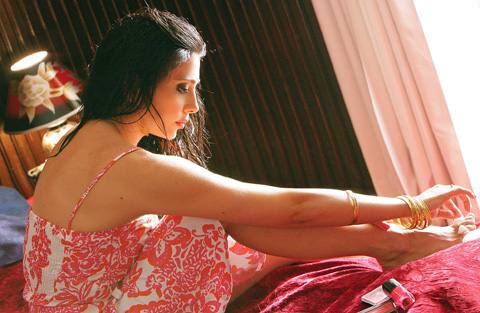The Beirut beauty salon where most of Caramel takes place is likely to be a familiar type of establishment, even to viewers who have never been to the
Lebanese capital. What the shop lacks in sleekness and chic it makes up for in the kind of friendly, sisterly warmth that could be found, for instance, in Beauty Shop, the distaff installation in the Barbershop franchise.
Women of various shapes, sizes, ages and backgrounds gather to bond and gossip. Their camaraderie is occasionally disrupted by a crisis, but you are likely to remember this charming film, directed by Nadine Labaki, less for its gently comic, mildly melodramatic plot than for its friendly and inviting atmosphere.

PHOTOS COURTESY OF JOINT
Labaki, who also wrote the screenplay with Jihad Hojeily and Rodney Al Haddad, plays Layale, owner of the shop, which is called Si Belle. Like many unmarried women in the Middle East, Layale, in spite of her professional independence, lives with her parents. She is also having an affair with a married man and spends anxious hours waiting for him to call, ignoring the attentions of a handsome traffic policeman who is obviously smitten with her.
Layale’s friends and co-workers are supportive and tolerant of her, and also have troubles of their own. Jamale (Gisele Aouad) is a recently divorced actress made frantic by the necessity of competing with younger women for work in television commercials. Nisrine (Yasmine Al Masri), a Muslim, is engaged and is worried about what will happen if her future husband discovers that she isn’t a virgin. Rima (Joanna Moukarzel), who cleans up around the shop and washes hair, develops a crush on an elegant client. And then there is Aunt Rose (Siham Haddad), a seamstress who lives down the street from Layale’s shop with her demanding, mentally disabled sister, Lili (Aziza Semaan).
It all has the makings of a mild soap opera, or perhaps a Pedro Almodovar film without camp or kinkiness. And Labaki is less interested in breaking new ground than in providing her audience the kind of comfort and catharsis that her characters give one another. Which is not to say that Caramel is overly soft or sweet.

PHOTOS COURTESY OF JOINT
The title refers to a hot-sugar concoction that, while edible, is mainly used, like wax, for hair removal. Lovely and smooth as Labaki’s film (and her cast) may be, there are also twinges of real pain and disappointment.
Caramel has an optimism born not of dreamy romanticism but of resilience and a degree of hard-headedness. Life for these women is not easy or especially fair, and each of them faces moments of humiliation, loneliness and potential heartbreak. But in the best melodramatic tradition, their toughness, good humor and loyalty see them through. Those qualities, and Labaki’s evident affection for the battered panache of her native city, make Caramel hard to resist.

In the March 9 edition of the Taipei Times a piece by Ninon Godefroy ran with the headine “The quiet, gentle rhythm of Taiwan.” It started with the line “Taiwan is a small, humble place. There is no Eiffel Tower, no pyramids — no singular attraction that draws the world’s attention.” I laughed out loud at that. This was out of no disrespect for the author or the piece, which made some interesting analogies and good points about how both Din Tai Fung’s and Taiwan Semiconductor Manufacturing Co’s (TSMC, 台積電) meticulous attention to detail and quality are not quite up to

April 21 to April 27 Hsieh Er’s (謝娥) political fortunes were rising fast after she got out of jail and joined the Chinese Nationalist Party (KMT) in December 1945. Not only did she hold key positions in various committees, she was elected the only woman on the Taipei City Council and headed to Nanjing in 1946 as the sole Taiwanese female representative to the National Constituent Assembly. With the support of first lady Soong May-ling (宋美齡), she started the Taipei Women’s Association and Taiwan Provincial Women’s Association, where she

Chinese Nationalist Party (KMT) Chairman Eric Chu (朱立倫) hatched a bold plan to charge forward and seize the initiative when he held a protest in front of the Taipei City Prosecutors’ Office. Though risky, because illegal, its success would help tackle at least six problems facing both himself and the KMT. What he did not see coming was Taipei Mayor Chiang Wan-an (將萬安) tripping him up out of the gate. In spite of Chu being the most consequential and successful KMT chairman since the early 2010s — arguably saving the party from financial ruin and restoring its electoral viability —

It is one of the more remarkable facts of Taiwan history that it was never occupied or claimed by any of the numerous kingdoms of southern China — Han or otherwise — that lay just across the water from it. None of their brilliant ministers ever discovered that Taiwan was a “core interest” of the state whose annexation was “inevitable.” As Paul Kua notes in an excellent monograph laying out how the Portuguese gave Taiwan the name “Formosa,” the first Europeans to express an interest in occupying Taiwan were the Spanish. Tonio Andrade in his seminal work, How Taiwan Became Chinese,